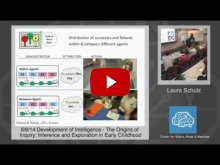Laura Schulz: The Origins of Inquiry: Inference and Exploration in Early Childhood
Topics: Brief historical overview of key research that revolutionized the study of cognitive development; analogies between how scientists and children learn; overview of studies showing that (1) childrens’ generalizations depend on how evidence is sampled (Gweon, Tenenbaum, Schulz, PNAS 2010), (2) children infer the relative probability of hypotheses and choose interventions most likely to achieve desired outcomes (Gweon, Schulz, Science 2011), and (3) children isolate variables to distinguish competing hypotheses (Cook, Goodman, Schulz, Cognition 2011); If children are so smart why is learning so hard? Because of (1) limited image processing capabilities, (2) limited world knowledge, and because (3) inductive biases constrain learning (Schulz, Bonawitz, Griffiths, Developmental Psychology 2007; Bonawitz, Fischer, Schulz, J. Cognition & Development 2012; Bonawitz, VanSchijndel, Friel, Schulz, Cognitive Psychology 2012; Schulz, Goodman, Tenenbaum, Jenkins, Cognition 2008))

